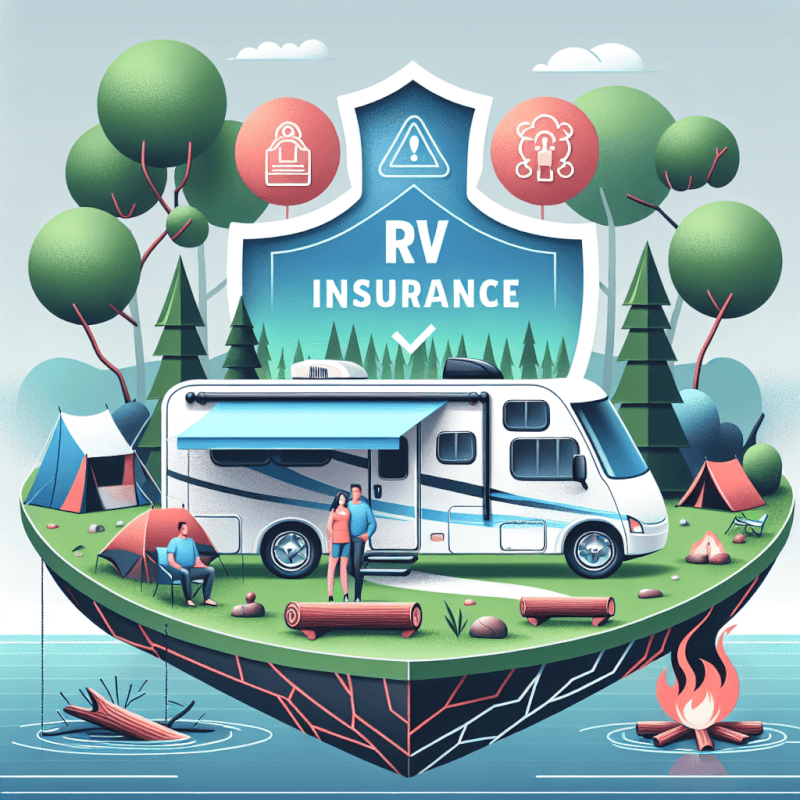So you’ve just purchased an RV and you’re ready to hit the open road, but before you do, there’s one question that you need to answer: what type of insurance do you need for your new adventure on wheels? Whether you’re a full-time RV enthusiast or a weekend warrior, protecting your investment is crucial. In this article, we’ll explore the various types of insurance coverage for RVs, helping you navigate your options and find the protection that suits your needs. So buckle up and let’s dive into the world of RV insurance!
Understanding RV Insurance
Why is RV insurance important?
RV insurance is important because it provides financial protection in case of accidents, damages, or losses involving your RV. Like any other vehicle, your RV is susceptible to accidents, theft, and damage caused by natural disasters. Having RV insurance gives you peace of mind knowing that you are financially safeguarded in these situations.
What does RV insurance cover?
RV insurance typically covers a wide range of scenarios. It usually includes liability coverage, which pays for the damages caused to others in an accident where you are at fault. RV insurance also includes collision coverage, which covers damage to your RV resulting from a collision. Additionally, comprehensive coverage includes protection against theft, vandalism, natural disasters, and other non-collision-related damages.
Is RV insurance required?
RV insurance is not mandatory in all states, but it is highly recommended and often required by lenders if you have an outstanding loan on your RV. Even if it is not legally required in your state, it is wise to have RV insurance to protect your valuable investment and ensure that you are covered in case of an accident.
Different types of RV insurance
There are different types of RV insurance available to suit your specific needs. The most common types include liability insurance, collision insurance, comprehensive insurance, uninsured/underinsured motorist coverage, medical payments coverage, and personal injury protection (PIP). Understanding these different types of coverage is crucial in choosing the right insurance policy for your RV.
Choosing the Right Coverage
Consider your RV’s value
When choosing RV insurance, it is essential to consider the value of your RV. The value of your RV will determine the amount of coverage you need and the associated premiums. If you have a brand-new, high-value RV, you may want to consider comprehensive coverage to protect against any potential damages or losses. On the other hand, if your RV is older and its value has depreciated, you may opt for less coverage to save on insurance costs.
Consider your RV’s usage
Another crucial factor to consider is how you plan to use your RV. If you only use your RV occasionally for vacations or weekend getaways, your insurance needs may be different compared to someone who uses their RV as a full-time residence. Understanding your RV’s usage will help determine what type and amount of coverage you need to adequately protect your investment.
Evaluate your personal belongings
When choosing RV insurance, it is important to assess the value of your personal belongings inside the RV. Most insurance policies offer some level of coverage for personal belongings in the event of theft, fire, or other covered losses. However, it is essential to review the coverage limits and consider purchasing additional coverage if you have valuable or sentimental items in your RV.
Assess liability coverage
Liability coverage is a crucial component of RV insurance. It protects you financially if you are found at fault in an accident that causes property damage or bodily injury to others. When choosing RV insurance, carefully consider the liability coverage limits offered. It is recommended to select coverage that exceeds the minimum requirements in your state to adequately protect your assets in the event of a lawsuit.
Look for additional coverage options
In addition to the basic coverage options, it is worth exploring additional coverage options that may suit your needs. These additional coverages may include roadside assistance, vacation liability coverage, emergency expense coverage, total loss replacement coverage, and contents coverage. Each of these options provides added protection and peace of mind while traveling in your RV.
Compare insurance providers
Once you have determined the coverage options you need, it is crucial to compare insurance providers to find the best policy for your RV. Consider factors such as customer reviews, financial stability of the insurer, claims process, and customer service. Obtaining quotes from multiple providers and comparing the coverage options and premiums will help you make an informed decision.

Factors Affecting Insurance Rates
RV type and class
The type and class of your RV will significantly impact your insurance rates. Different insurance companies may classify RVs differently, but common classifications include Class A, Class B, and Class C motorhomes, as well as travel trailers, fifth wheels, and camper vans. Typically, Class A motorhomes have higher premiums due to their larger size and higher value compared to smaller RV types.
Age and condition of the RV
The age and condition of your RV will also affect your insurance rates. Newer RVs generally have higher insurance costs since they are more valuable and may require higher coverage limits. Additionally, older RVs may require additional inspections or maintenance to meet insurance requirements, which can impact your premiums.
Driving history and experience
Insurance companies also consider your driving history and experience when determining your RV insurance rates. If you have a clean driving record with no accidents or traffic violations, you may qualify for lower premiums. Conversely, a history of accidents or traffic violations may result in higher insurance rates.
Location and storage
Your location and where you store your RV when it is not in use can impact your insurance rates. Areas with higher rates of accidents, theft, or extreme weather conditions may lead to higher premiums. Additionally, storing your RV in a secure facility or using anti-theft devices can potentially lower your insurance costs.
Deductibles and coverage limits
The deductibles you choose and the coverage limits you select will affect your insurance rates. Higher deductibles typically result in lower premiums, but it is important to ensure that you can afford the deductible in case of a claim. Likewise, higher coverage limits may increase premiums, but they provide more financial protection in the event of a loss.
Discounts and savings
Insurance companies often offer various discounts and savings opportunities that can help lower your RV insurance premiums. Common discounts include multi-policy discounts for bundling your RV insurance with other policies, safe driver discounts, paid-in-full discounts, and discounts for completing an RV safety course. Be sure to inquire about available discounts when obtaining insurance quotes.
Basic RV Insurance Types
Liability insurance
Liability insurance is a fundamental type of RV insurance that covers the costs associated with property damage or bodily injury to others in an accident where you are found at fault. This coverage is essential as it provides financial protection and helps cover legal expenses in the event of a lawsuit.
Collision insurance
Collision insurance covers the cost of repairs or replacement for your RV if it is damaged as a result of a collision with another vehicle or object. It is especially important for RVs, considering their size and potential damage in a collision.
Comprehensive insurance
Comprehensive insurance provides coverage for damages to your RV caused by non-collision incidents such as theft, vandalism, fire, falling objects, or natural disasters. This coverage is essential for protecting your RV against a wide range of potential risks.
Uninsured/Underinsured motorist coverage
Uninsured/underinsured motorist coverage protects you if you are involved in an accident with a driver who lacks insurance or has insufficient coverage to pay for damages or injuries. This coverage helps ensure that you are not left with out-of-pocket expenses in such situations.
Medical payments coverage
Medical payments coverage, also known as MedPay, covers the medical expenses of you and your passengers resulting from an RV accident, regardless of fault. It provides peace of mind knowing that medical bills are taken care of if injuries occur.
Personal injury protection (PIP)
Personal injury protection, or PIP, provides broader coverage than medical payments coverage. It typically covers medical expenses, lost wages, and other related costs resulting from an RV accident. PIP coverage may vary by state, so it is important to check your specific policy.

Additional RV Insurance Types
Total loss replacement coverage
Total loss replacement coverage is an additional coverage option that replaces your RV with a brand-new model of similar or equal value if your RV is deemed a total loss. This coverage is especially beneficial for newer RVs to ensure that you can replace your investment in the event of a total loss.
Contents coverage
Contents coverage protects the personal belongings inside your RV, such as clothing, electronics, kitchen equipment, and furniture. It provides coverage in case of theft, fire, or other covered losses. It is important to assess the value of your belongings and select an appropriate coverage limit for your needs.
Emergency expense coverage
Emergency expense coverage reimburses you for expenses incurred due to an emergency while traveling in your RV. This can include lodging, transportation, and meals if your RV becomes uninhabitable due to a covered loss.
Vacation liability coverage
Vacation liability coverage provides liability coverage above and beyond your standard liability coverage while using your RV as a temporary vacation residence. This coverage protects you if someone gets injured or experiences property damage while on vacation in your RV.
Roadside assistance coverage
Roadside assistance coverage is a valuable addition to your RV insurance policy. It provides assistance in case of a breakdown or other roadside emergencies. Services often include towing, tire changes, fuel delivery, and lockout assistance.
Full-timer coverage
Full-timer coverage is designed for those who use their RV as their primary residence. It provides coverage similar to a homeowners policy and usually includes personal liability, loss of use, and additional living expenses coverage.
Factors to Consider when Buying RV Insurance
RV usage frequency
Consider how frequently you plan to use your RV. If you only use it sporadically, you may opt for less coverage or choose seasonal coverage when your RV is not in use. On the other hand, if you use your RV frequently or full-time, you will need more comprehensive coverage to protect your investment.
Length of trips
If you frequently embark on long trips, you may need additional coverage options such as emergency expense coverage or roadside assistance. These coverages can provide peace of mind and financial protection when you are far from home and encounter unexpected situations.
Storage location
The location where you store your RV when it is not in use can impact your insurance rates and coverage options. Storing your RV in a secure facility may lower your premiums, and insurers may offer additional coverage options if the storage facility meets certain criteria.
RV value
The value of your RV is a key factor in choosing the right insurance policy. Newer and more expensive RVs typically require higher coverage limits, while older RVs with lower values may be suitable for less coverage. Evaluate the value of your RV and select coverage accordingly.
Budget and affordability
As with any insurance policy, you must consider your budget and the affordability of the premiums. Review different coverage options, deductibles, and associated costs to find a balance between adequate coverage and affordability.
Desired coverage options
Consider the additional coverage options available and assess which ones are essential for your RV lifestyle. Whether you prioritize roadside assistance, vacation liability coverage, or full-timer coverage, ensure that your policy includes the coverage options that align with your needs.
Claims process and customer service
Finally, consider the claims process and customer service offered by insurance providers. Read customer reviews and gather information about the insurer’s reputation for handling claims efficiently and providing excellent customer service. A reliable and responsive insurance company is crucial in the event of a claim.

Costs and Discounts
Factors influencing insurance costs
Various factors impact RV insurance costs. These include the value and type of your RV, your driving history and experience, your location, the coverage limits and deductibles you choose, and any additional coverage options you select. Evaluating these factors can help you understand and manage your insurance costs effectively.
Ways to lower insurance premiums
While insurance costs may vary, there are several ways to potentially lower your RV insurance premiums. Taking advantage of discounts offered by insurance companies, maintaining a clean driving record, installing anti-theft devices, storing your RV in a secure location, and bundling your RV insurance with other policies are just a few strategies to consider.
Discounts offered by insurance companies
Insurance companies often offer various discounts that can help reduce your RV insurance premiums. Some common discounts include multi-policy discounts, safe driver discounts, paid-in-full discounts, RV association membership discounts, and RV safety course discounts. Be sure to ask about available discounts when obtaining quotes from different insurance providers.
Tips for Finding the Best RV Insurance
Research and compare multiple providers
Take the time to research and compare multiple insurance providers to find the best RV insurance policy for your needs. Gather quotes, read customer reviews, and consider the reputation, financial stability, and customer service of each insurer. This thorough research ensures that you choose an insurance provider that meets your requirements.
Read customer reviews
Customer reviews can provide valuable insights into an insurance company’s reliability, claims process, and customer service. Read reviews from current and past customers to gauge their experiences and satisfaction with the insurance provider. This information can help you make an informed decision when selecting an RV insurance policy.
Consider independent insurance agents
Working with an independent insurance agent can simplify the process of finding the best RV insurance. These agents work with multiple insurance providers and can provide objective advice tailored to your specific needs. They can help you navigate through different coverage options, discounts, and policy terms.
Take advantage of free quotes
Many insurance providers offer free quotes, allowing you to compare premiums and coverage options. Take advantage of this opportunity to obtain quotes from multiple providers and make an informed decision based on price and coverage.
Check for RV-specific insurance companies
Consider checking for insurance companies that specialize in RV coverage. These companies often have expertise and tailored policies specifically designed for RV owners. They understand the unique needs and risks associated with RVs, ensuring that you get the right coverage.
Review policy terms and conditions
Before committing to an RV insurance policy, thoroughly review the policy terms and conditions. Pay attention to coverage limits, exclusions, deductibles, and any additional fees. Understanding the details of your policy ensures that you are adequately covered and know what to expect in the event of a claim.
Consider bundling with existing policies
If you already have insurance policies such as auto, homeowners, or renters insurance, consider bundling your RV insurance with these policies. Many insurance companies offer multi-policy discounts, which can significantly reduce your overall insurance costs while maintaining comprehensive coverage across all your assets.

Frequently Asked Questions
Do I need RV insurance?
While RV insurance is not always legally required, it is highly recommended for the protection and financial security it provides. Without insurance, you may be personally responsible for paying for damages, injuries, or loss related to your RV. Additionally, lenders often require RV insurance if you have an outstanding loan on your RV.
Can I use my auto insurance for my RV?
While some auto insurance policies may provide limited coverage for RVs, it is generally insufficient for adequately protecting your investment. Auto insurance policies rarely cover the unique risks and value associated with RVs. It is recommended to purchase specialized RV insurance to ensure comprehensive coverage.
What if I rent my RV?
If you rent out your RV to others, a standard RV insurance policy may not provide adequate coverage. Renting your RV introduces additional liability risks, and insurance companies may require a separate commercial policy or an endorsement to your existing policy. Contact your insurance provider to discuss your specific situation and ensure proper coverage.
What deductible should I choose?
Choosing the right deductible depends on your budget, risk tolerance, and the value of your RV. A higher deductible typically results in a lower premium, but you must be prepared to pay that deductible out of pocket in the event of a claim. Evaluate your financial circumstances and select a deductible that aligns with your comfort level.
What happens if my RV is totaled?
If your RV is deemed a total loss, meaning the cost of repairs exceeds the actual cash value of the RV, your insurance company will typically provide you with a settlement. The settlement amount is typically based on the actual cash value of the RV at the time of the loss. Depending on your policy, you may have the option to purchase total loss replacement coverage, which provides the ability to replace your RV with a brand-new model.
How do I file an insurance claim?
In the event of an accident, damage, or loss, promptly contact your insurance company to file an insurance claim. Many insurance companies offer 24/7 claims reporting assistance to ensure you receive the necessary support and guidance. The claims process typically involves providing details of the incident, submitting any relevant documentation, and working with an adjuster to assess the damages and determine the appropriate coverage.


